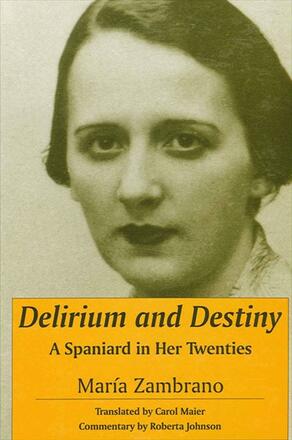
Delirium and Destiny
A Spaniard in Her Twenties
Alternative formats available from:
Written by one of twentieth-century Spain's most prominent intellectuals, this book--part memoir, part lyrical novel--is both a Bildungsroman about a young woman's intellectual formation during a crucial period of Spanish history (1929-1931) and a philosophical meditation upon the individual's place in society.
Description
Maria Zambrano's Delirium and Destiny makes the work of this major Spanish philosopher available in English for the first time. An excellent introduction to Zambrano's life and thought, it traces the intellectual formation of a young woman who became one of Jose Ortega y Gasset's most distinguished pupils, and it chronicles Zambrano's redefinition of his philosophical positions. A truly interdisciplinary work, this translation is accompanied by an extensive critical essay, a translator's afterword, and a glossary of pertinent historical and philosophical terms.
In 1988, Maria Zambrano (1904-1991) became the first woman to win the Miguel de Cervantes Prize, the most prestigious award available to Spanish-language writers. She was the author of more than thirty books and was one of the most important disciples of Jose Ortega y Gasset. Carol Maier is Professor of Spanish at Kent State University. She has translated and edited many volumes, and the awards for her work include the Meritorious Achievement for Translation from the Kayden Translation Committee, the MLA Aldo and Jeanne Scaglione Prize for a Translation of a Literary Work, and the Outstanding Translation of the Year from American Literary Translators. Roberta Johnson is Professor of Spanish at the University of Kansas and the author of four books, including Philosophy and the Novel in Spain: 1900-1934.
Reviews
"This book offers unique insights provided by a woman who was actively involved in the intellectual, historical, and cultural events that unfolded in the first half of this century in Spain. She writes with perception and candor about her encounters with twentieth-century Spain's intellectual and literary giants: Unamuno, Ortega y Gasset, Machado, and many others. Reading this book has made me aware how important this type of personal account is to the better understanding of writers, thinkers, and the events that surrounded them. " — Barbara N. Gantt, Northern Arizona University
"The book is significant in various ways: it gives a fascinating account of the birth of a powerful intellect to ideology--not doctrinaire ideology, but the commitment of a concerned liberal mind. It does this in the context of a historical turning point for Spain and for Europe. It is important as well in its attention to the interface between philosophy and ideology, philosophy and personal agency.
"As a narrative it is unlike any other that I know, blending skillfully and compellingly philosophy and daily living, engagement and emotional growth. I can think of no other book like it. "--Salvador J. Fajardo, Binghamton University